College of College of Graduate Studies
Africa-centred energy technologies are safe and sustainable
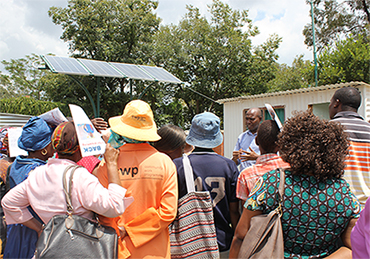
Dr David Kimemia (SAMRC-ISHS) explains to the Thembelihle community members how the cool coating paint and solar home system operate.
Clean, safe and sustainable energy is a rare commodity in Africa and access to it is a challenge that many communities encounter. One such community is Thembelihle informal settlement near Lenasia. Although it was formally electrified in 2016, community members still resort to using wood fires and paraffin stoves to heat water and cook, often with serious health and safety implications.
A brighter, safer future awaits through the Safe and Sustainable Energy Project, a research collaboration between Unisa’s College of Graduate Studies Institute for Social and Health Sciences (ISHS) and the College of Science Engineering and Technology Institute for the Development of Energy for African Sustainability (IDEAS).
The two institutes showcased three safe, sustainable energy technologies at the ISHS’s Lenasia South premises on 28 February. This was part of Unisa’s 2018 Research & Innovation Week, which had the theme of “Research for sustaining our tomorrows”.
The three technologies they demonstrated were a cool coating paint (to keep the temperature down in shacks), a solar home system (to power appliances), and a biogas digester (to produce renewable energy for cooking and heating water).
Solutions that match community needs
Thembelihle is an impoverished community with countless issues, such as water and sanitation, infrastructure, and energy. “As researchers we want to understand, what the community needs in order to innovate purpose-fit solutions to their living conditions,” said Dr David Kimemia, South African Medical Research Council (SAMRC)-UNISA ISHS. With this in mind, scientists and engineers on the project actively engage with the Thembelihle community in co-design and co-production.
The first step was to build the demonstration site, where community members can see for themselves how the energy technologies work and have their questions answered. Currently, the project team is evaluating the efficiency of the technologies. Towards mid-2018, community pilots will be established. “We want to make the innovations sustainable, where a community adopts an innovation after being equipped with the necessary skills to drive the project as long as possible without needing intervention from experts,” said Dr Celestine Sempunga of Unisa IDEAS.
After the pilot period, the technologies will be rolled out into the community, ideally with a sustainable livelihood from the renewable energies.
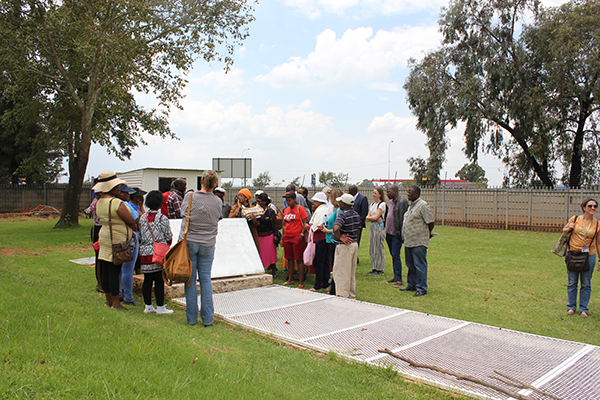
Dr Celestine Sempunga (Unisa IDEAS) takes Unisa staff and Thembelihle community members through the biogas digester process at the demonstration site.
More about the three technologies
Shacks can become extremely hot during summer, which can contribute to damaging the health of children and the elderly. The heat entering the shack can be reduced by the cool coating paint applied on the sides and on the roof. The cool coating decreases the temperature inside a shack by as much as 8° C.
Biogas, a clean alternative energy, is produced through a biodigester, a technology that has been around for a long time but has not been well applied, especially in Africa. Wet organic waste materials are placed inside the digester and kept air tight. The bacteria inside will consume the waste, producing gas that is suitable for cooking and heating water.
A solar home system gets its energy from the sun and can light up a house and power appliances such as a TV, refrigerator, kettle, and charge cell phones.
The main objective of the project is to contribute to the promotion of health, safety and peace of energy-poor communities by improving access to healthy, cleaner and safer energy technologies, using resources that are easily available, at little or no cost.
Here are some of the expected benefits of usage:
- Prevent accidents/harm (e.g. burns, drinking of paraffin, inhaling smoke from firewood)
- Supply sustainable energy supply and provide community self-sufficiency
- Promote peace by removing the cause of service delivery protests that people without access to basic services sometimes resort to.
Through community-engaged research, ISHS and IDEAS continue to develop initiatives about culture, safety and peace, social and epistemic justice and sustainable livelihood, putting Africa at the centre of its innovations.
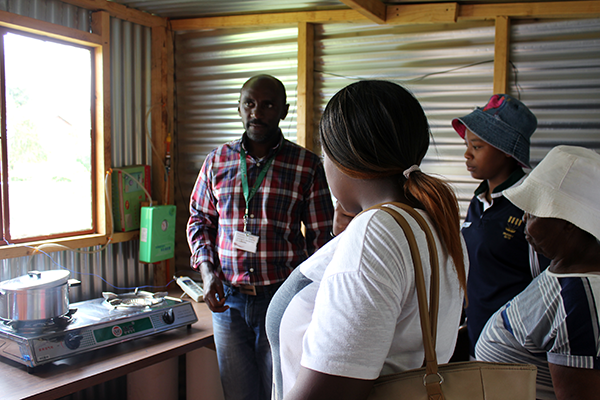
Dr Celestin Sempunga (Unisa IDEAS) shows the gas from the biodigester to Thembelihle informal settlement community members at the Unisa demonstration site.
*By Mpho Moloele
Publish date: 2018-03-29 00:00:00.0


 Breaking language barriers: SRU promotes inclusivity with multilingual support resources
Breaking language barriers: SRU promotes inclusivity with multilingual support resources
 Aiming at new heights: Professor Mashau takes helm as CHS's Deputy Dean
Aiming at new heights: Professor Mashau takes helm as CHS's Deputy Dean
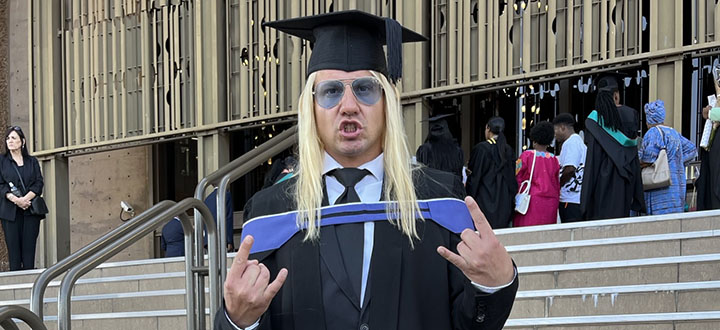 Don Cobra strikes a new chord: Musician earns a business degree
Don Cobra strikes a new chord: Musician earns a business degree
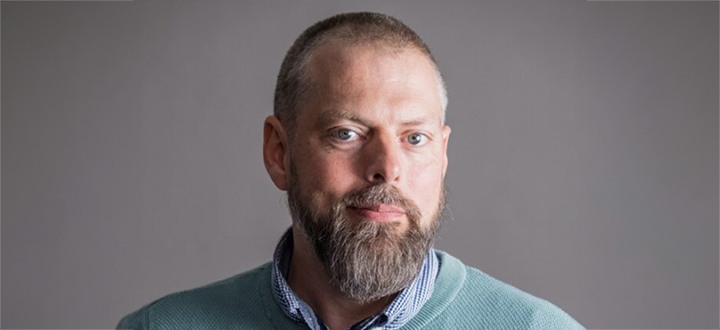 Unisan to lead Southern Africa region in "Building Equitable Futures Together" project
Unisan to lead Southern Africa region in "Building Equitable Futures Together" project
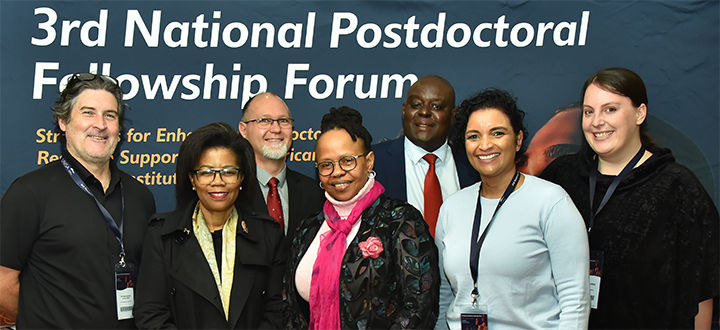 Unisa kicks off National Postdoctoral Fellowship Forum
Unisa kicks off National Postdoctoral Fellowship Forum